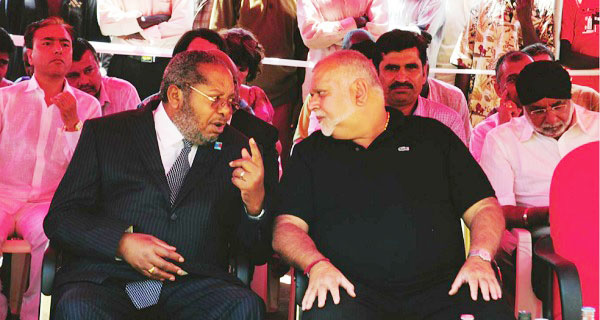
The IGG’s entry into the saga set her on a collision path with Mutebile. The governor has indicated that he will not cooperate with the IGG.
And if Kasekende is confirmed to be at the centre of the revolt against Mutebile; then IGG could not have picked a better fullback in the fight against Mutebile.
At the bank, two facts have been a public secret; one that Kasekende had been recalled from a top job at the African Development Bank (ADB) with a promise that he would succeed Mutebile, and two that in the transition planned by Kasekende, he would be the Governor and Bagyenda his deputy.
Indeed, every time he travelled and he did travel often, he left Bagyenda as the acting DG. Between January 2016 and March 2017, for instance, Kasekende travelled 23 times on average for a week. Over the same time, Bagyenda travelled 19 times. But every time Kasekende was out of office, he left Bagyenda in acting DG position.
Bagyenda is said to have worked closely with Kasekende on one of the most controversial transactions BoU has ever undertaken; the take over and sale of Crane Bank.
Kasekende reportedly signed off the central bank’s capital injection into Crane Bank before it was sold off.
But insiders say Bagyenda, who oversaw the transaction, tightly guarded its secrets to an extent that her immediate team was kept in the dark.
Many at the bank say the recent leaking of the sale agreement has shone light on the nature of the transaction, which has forced many at the bank to admit that even if Crane Bank had over years had issues, the way it was taken over and sold is “heavily suspicious”.
It now looks to have cost BoU about Shs500 billion, of which some Shs300 billion could be lost. It has also locked the central bank up in costly litigation, and damaged its reputation for monetary integrity.
One official says owing to the manner in which the deal was handled, Bagyenda had months fallen out with some members of her team. But more than anything else, the deal led to a major fall-out between Bagyenda and Mutebile.
Indeed, while she was set to retire in June this year having spent 30 years at the bank; all of them in supervision, Mutebile replaced her in a controversial reshuffle.
Mutebile scuttles Kasekende’s plan
Apart from Bagyenda, insiders say, Kasekende has over the years used his position to build a team with which he would run things once Mutebile was out.
As deputy governor, Kasekende was directly in charge of recruitment together with the executive director administration. As a result, the deputy governor had over the years recruited many top, mid-level, and even junior staff. Some of these are his friends and a few with family ties to him. His last recruitment last year was intended to fill positions in the departments of pensions, internal audit, communication and agriculture credit schemes (ACS), among others. It sparked major trouble and led to the current saga.
Sources who spoke to The Independent mentioned names like Benedict Sekabila, Henry Tamale, Stephen Sendikadiwa Mwebe, Muwanga Lumala, and David Kalyango, who was controversially promoted to Executive Director Finance. Others mentioned are Stephen Mulema, Solomon Kavuma, a Deputy Director Financial Markets and Phillip Walulya, the Executive Director Operations, among others. Many of these were middle-rung officers that Kasekende placed in strategic positions.
While those who Kasekende gave juicy positions were happy, others who lost jobs were unhappy. They accused him of tribalism and favouritism.
Unfortunately, as happens in many appointments, some of Kasekende’s choices were not always the best, sources say.
In one eye-opening case, Ellyn I. Greenwald, an advisor to BoU from the U.S. Department of the Treasury, indicated to Mutebile in a memo that two senior bank officials at the level of Director lacked “the understanding and the ability to grasp basic concepts”.
This is after several cases of botched up procurements and collapse of systems right under their nose.
 The Independent Uganda: You get the Truth we Pay the Price
The Independent Uganda: You get the Truth we Pay the Price



My concerns about the Central bank are over its management of monetary policy. Uganda’s currency is very week, ranked amongst the bottom 10 in Africa. For over a decade, interest rates have been and continue to be at double-digit. That has significantly curtailed investment in capital-intensive businesses which is central to job creation and long-term economic growth.
Economics has moved on since the days Mutebile was at Havard or wherever it is he studied. His solutions to steering monetary policy are obsolete and are in part contributing to high youth unemployment.
Uganda needs to reinvent the economy. It will require new thinking at the helm of the Central Bank.
Has this National bank the capacity to repay the accumulated international loans that seem to continue to raise as long serving politicians insist on governing the country as of right!
What if this country seems to want to go the way of governance by a State of Emergency and a Curfew so that the lives and properties of the citizens of Uganda are better protected. Will such a state of political affairs sustain the current stable economic affairs of this African country?
Under such undertones, how can an investor these days try to bring in good money for investment in this country and at the end of the day loose it all at the blink of an eye. Whom is he or her going to blame for such a loss.
Your insinuation of tribal changes by Kasekende wont fly in the Uganda we know. Many posts in government bodies are full of me and you.